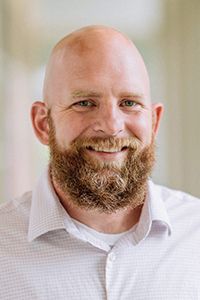
|
Benjamin Lovaasen, Ph.D.Associate Professor, Inorganic Chemistry
On Faculty since 2011
|
- Biography
- Education
- Areas of Expertise
- Professional Affiliations
- Presentations
- Courses Taught
- Research
- Selected Publications
Dr. Lovaasen is interested broadly in the chemistry of transition metal complexes that interact with light (chromophores). Once excited, these molecules have remarkable chemical properties. For example they are both easier to reduce and to oxidize than they are in their ground state; the energetic excited states of transition metal complexes are competent to perform difficult reactions, such as reducing CO2 to a sustainable fuel or oxidizing water to O2. As a graduate of a small, liberal arts institution, Dr. Lovaasen is excited to explore these molecules side-by-side in the classroom and laboratory with students. Dr. Lovaasen met his wife, Emily, at Valparaiso University. They spent 4 years living on the southside of Chicago and they spend as much time back in the city as they can. They have two boys and can be found on the weekends exploring the various parks and bike trails in the Chicagoland area.
The University of Chicago
Ph. D., Chemistry, 2011
The University of Chicago
M. S., Chemistry, 2005
Valparaiso University
B. S., Chemistry, 2004
- Analytical Chemistry
- Organometallic Chemistry
- Chemistry
- Metals
- Inorganic Chemistry
American Chemical Society
Design and Characterization of bis(terpyridyl)chromium(III) complexes with enhanced visible absorption and emission
251st American Chemical Society National Meeting, San Diego, CA
- General Chemistry I and II
- Introduction to Analytical Chemistry
- Introduction to Inorganic Chemistry
- Advanced Inorganic Chemistry
- Organometallic Chemistry
- Advanced Topics in Inorganic Chemistry
- Inorganic Chemistry Research
- Chemistry Colloquium
The excited states of transition metal complexes contain unique electrochemical, photochemical and geometric properties. These excited states are able to perform challenging transformations that are not available to the ground states of the complexes. Two such examples are photoredox catalysis and the utilization of solar energy to form fuels. Dr. Lovaasen’s research interests include the development of chromophores and chromophore assemblies based on inexpensive, earth-abundant metals. Recently, the Lovaasen group has been focused on designing Cr(III) polypyridyl chromophores with improved excited-state properties.
Cr(III) polypyridyl complexes are potent photooxidants with applications in photoredox catalysis and DNA oxidation. Their excited-state reduction potentials are large enough to sensitize a broad range of catalysts for water oxidation. Design of functional Cr(III) chromophores for photoredox chemistry is met by a number of challenges. Chief among these challenges is the lack of strong visible absorption bands. The redox-active excited-state of Cr(III) polypyridyl complexes emit in the near-infrared. Therefore, visible-absorbing, ligand-based excited states are energetically competent to populate the long-lived Cr(III) excited state. Current research by the Lovaasen group is aimed towards designing Cr(III) polypyridyl chromophores with visible-absorbing, ligand-based excited states, and studying the energy migration in these complexes. An additional limitation to the broad application of these chromophores is their photosubstitution chemistry. Current attempts towards suppressing the photosubstitution chemistry of these complexes involve designing Cr(III) chromophores with increased denticity and modified steric considerations.
Research Students
James Millikan, Jonathan Hopwood, Nathan Hartman, Jay Allen, John Seeler, Luke Fulton, Elsemarie DeVries, Alex Foote, Amy Kim, Andrew Grorud, Whitman Wiggins, Johanna Barbour
Chromium(III) Bis-Arylterpyridyl Complexes with Enhanced Visible Absorption via Incorporation of Intraligand Charge-Transfer Transitions Inorganic Chemistry
Barbour, J. C.; Kim, A. J. I.; deVries, E.; Shaner, S. E.; Lovaasen, B. M., 2017
Near-infrared transient-absorption spectroscopy of zinc tetraphenylporphyrin and related compounds. Observation of bands that selectively probe the S1 excited state. Journal of Photochemistry and Photobiology A: Chemistry
Moravec, D.B.; Lovaasen, B.L.; Hopkins, M.D., 2013
Gound-State and Excited-State Structures of Tungsten—Benzylidyne Complexes Inorganic Chemistry
Lovaasen, B.L.; Lockard, J.V.; Cohen, B.W.; Yang, S.; Simpson, C.K.; Chen, L.X.; Hopkins, M.D., 2012